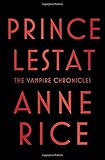 Anne Rice returns to her Vampire Chronicles with Prince Lestat. Rice had said she was not going to write more vampire books, but Prince Lestat is the first in a new planned series.
Anne Rice returns to her Vampire Chronicles with Prince Lestat. Rice had said she was not going to write more vampire books, but Prince Lestat is the first in a new planned series.
As the book begins, a strange voice is speaking to many of the vampires, mostly the oldest vampires, begging them to immolate the younger vampires and “thin the herd.” Lestat hears the voice, too, and tries to shut it out. He is dragged out of seclusion by his fellow vampires, who want his help in fighting the voice.
I hesitate to summarize too much because if you’re planning to read this book, you’ll not want too much to be given away. Anne Rice is back in typical form. I have to say this line from the New York Times review of the novel captures the book well (and made me laugh): “Although this is a dreadful novel, it has to be said that the earnestness with which Rice continues to toil at her brand of pop sorcery has an odd, retro sort of charm, an aura redolent of the desperate, decadent silliness of the disco era.”
I am not sure I’d go quite so far as to call it dreadful (and keep in mind that Memnoch the Devil is the only book I have ever thrown across the room), but it’s not up to the heights of Interview with the Vampire or The Vampire Lestat. You will most likely wonder if Apple is paying Rice for product placement. All of the vampires seem to have iPhones, and they seem to use them and talk about them a lot. They also have Mac computers. Thus, I’d agree with the second part of the Times‘s description.
Lestat is his usual self in this one. You’re going to wonder about the sanity of the vampire collective at the end, if you were not already wondering. All of the oldest vampires make a reappearance here, and if you’re into world-building, you’ll learn quite a lot more about vampire origins and some of the oldest vampires, and you’ll also find out how the Talamasca came to be. As such, I had thought while reading the book that perhaps Rice was trying to answer all the open questions and call it a day. However, it’s fairly clear at the end that she’s getting her second wind. God help us all.
I kid, but not much. These books have a weird sort of charm. I sort of enjoy them at the same time as I’m rolling my eyes at Rice’s lavish description and strange tangents (Rose’s story in this one). I am not sure if I have the fortitude to brave another one, but this one wasn’t bad as far as her books go. I listened to it on audio, and the narrator, Simon Vance, was an excellent reader. I kept wondering what he thought about what he was reading, and I wondered if he were thinking the same things as I was. I do think it will appeal to anyone who wanted to know more after The Queen of the Damned.
These two reviews were pretty fair and even-handed:
Rating: 




Audio Rating: 



